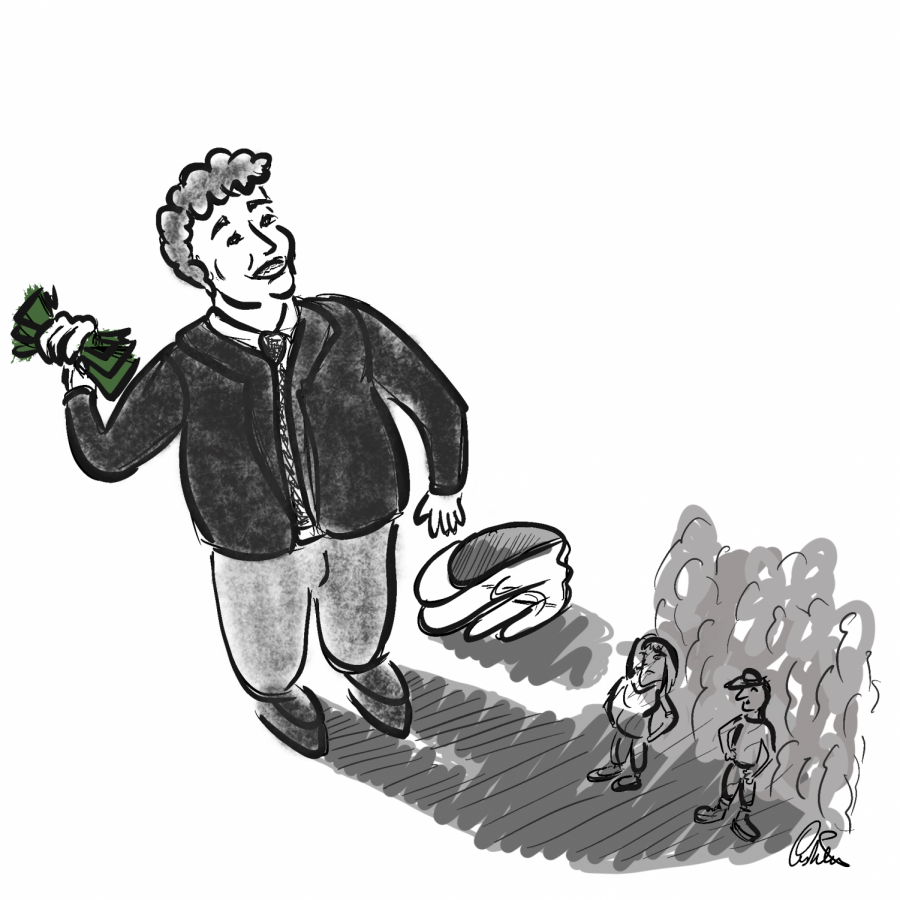Even in the Midst of a Pandemic, Big Businesses Continue to Steal From the Small Ones
Graphic by Ashlee Kothenbeutel
As we’ve spent the last few weeks in our homes with our families, news from the outside world continues to flood our phones, TVs and the internet. Protests against stay-at-home orders, implications from the President that injecting disinfectant into the lungs would be effective in killing COVID-19 and excitement about incoming stimulus checks make up a mere fraction of the tidal wave of information that bombards us each day.
In the midst of this torrent, it can be hard to glean what really matters from the regular news cycle. You may have heard whispers about a grant program by the federal government meant to keep small businesses afloat during this economic shutdown. The Paycheck Protection Program (PPP) is meant to provide these businesses with the means to continue paying their employees, utilities and other fees. These loans may also be forgiven if the recipients can prove that they used the money in this manner. This means that businesses won’t be obligated to pay the money back if they can prove that they used it to pay and retain employees, pay rent, etc.
Sounds like a pretty good deal, right? The idea is that free money for small businesses will help kickstart the economy once quarantine orders are lifted nationwide and things start going back to normal. In many ways, the program will help take some of the burden of this pandemic off of the small businesses struggling to make it. The PPP passed with a $349 billion pool to draw on, but quickly ran out before it was replenished with an additional $310 billion with Congressional approval. While it’s great that the program is being utilized, the question remains: where is all this money going?
That’s where things get a little hairy: it’s recently come to light that several publicly-traded companies applied for and received the loans. These companies have the funds and liquidity to easily weather the pandemic, yet received funds that were specifically meant for small, private businesses. Shake Shack, a national restaurant chain that still provides to-go ordering for customers, received a $10 million dollar loan from the program. AutoNation, a nation-wide company that has more than 360 retail outlets, received $77 million from the fund. After receiving well-earned public criticism, both companies said that they would return the money.
So who’s deciding where the money from the PPP goes? The answer to that question is also somewhat complicated. The Small Business Administration (SBA) is the instrument through which people may obtain the loans, but it seems that many applicants go through their own private banks to get the money funneled to them. This means that there isn’t a ton of direct oversight from the federal government on who exactly the banks approve for the loans, which allows for big businesses to sneak under the radar and nab these highly desirable loans.
The Coronavirus Aid, Relief and Economic Security (CARES) Act established the PPP as part of its official legislation. The initial $349 billion allocated to the program contributed to the $2 trillion price tag of the CARES Act and has only increased since the funds in the program ran out so quickly. The act gave quite a bit of leeway to the Secretary of the Treasury, Steve Mnuchin, in how to distribute the PPP money. As a result, many have taken to blaming Secretary Mnuchin for the botched manner in which the PPP was carried out.
In my mind, however, both the government and the people of the United States aren’t pinning some well-deserved criticism on the middle men in these transactions: the banks. In the United States, banks hold quite a bit of power over the welfare of the economy. In 2008, the variable-rate mortgages that banks contracted to wannabe homeowners contributed to the Great Recession, yet very little legislation was passed on a federal level to prevent the same practices from being carried out again. Now, banks are major players in how these PPP loans are distributed. These major financial institutions continue to demonstrate to the American people that they can’t be trusted.
All in all, I think it’s important to give some leeway to the government as they figure out how to best deal with this unprecedented pandemic. That being said, the upper echelons of the administration shouldn’t be giving out free money to businesses that have no need for the cash. When a big business receives a PPP loan, a dozen small businesses across America might fail as a result. If this administration is truly pro-small business, they need to start acting like it.
Your donation will support the student journalists of Saint Louis University.





